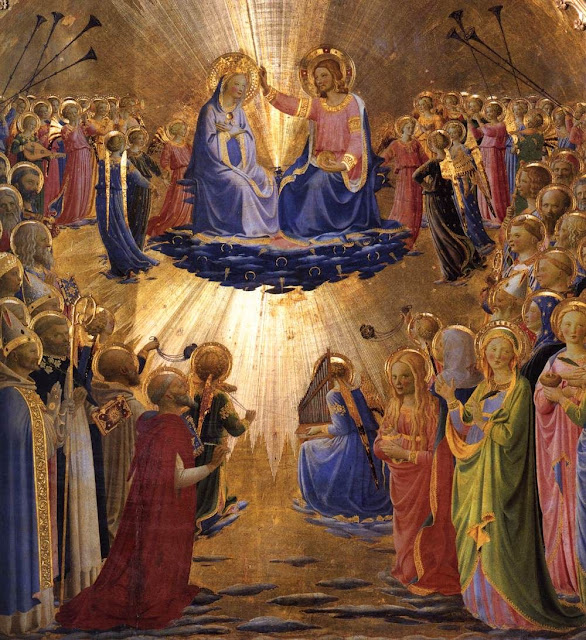You'll be intrigued to know I preached on Our Lord's baptism this morning, explaining that the waters of the Jordon prefigured a more agonizing baptism, that of the Cross. There on Calvary, the sinless Christ descends in solidarity with sinners into the dark waters of death, only to rise up, Spirit anointed, the acclaimed Son of the Father.
So as with the Magi, we see Him manifest as our divine King who dies for the remission of sin, all this prefigured in the Jordan. Call to action? We who participate in this saving act by virtue of our incorporation into Christ begun at baptism must likewise manifest Him to the world.
That was the gist of it and not bad for all that; the identifying gold, frankincense and myrrh, kingship, divinity and death, of the Feast of the Epiphany is carried forward into the revelation given to us at Christ's baptism. If you live in Him, and the Christian does, then you too must manifest His glory. But what does that look like or mean?
I gave this last aspect short treatment. Viz. stand fast to the Faith, flee from sin and boldly confess the Good News of salvation in Christ. True enough, but Farrer enlarges:
We never come to God without committing ourselves to him entirely, so far as in us lies, and in the present moment. It seems sometimes to be preached, however, that by a decision once for all made, we can commit ourselves irrevocably. But if this is preached, then it is not true. Today’s decisions cannot tie tomorrow’s hands. What I give to God today, such is my frailty, I may take back or withhold tomorrow. It is through this that God disciplines me, through this that he breaks my pride. The heart is sick and desperately perverse, even the redeemed heart: what it gave God yesterday it takes back today. Our wickedness is so great that we fail to do promised actions, which we had perfectly envisaged at the time of promising. But even if we had the virtue to keep our promise with God when the circumstances are foreseen and unaltered, we should still lack the power to commit ourselves on issues which cannot be perfectly felt or foreseen in advance. He who promises to be chaste, does well and may be perfectly sincere; but he has not by that promise dealt with the temptation he will face when he falls in mutual love with an actual woman, and cannot marry her. Our fences cannot be jumped beforehand, nor our battles won before the enemy appears. You promise fidelity to Christ today, and you are sincere; but it will spare you none of the agony of decision, if a day comes when political brigands hold to our heads the pistol of absolute power, and say, ‘Your religion or your life.’
No, we cannot commit ourselves in a day, because we cannot, merely by saying we will, put our whole trust in God. To trust in God is a thing which has to be learnt. We may stand up and make our profession of faith, clasp a missioner’s hand and say, ‘I have taken Christ for my Savior, I trust him for all.’ But we shall still trust ourselves to do our part in the new covenant we have entered. For we do not learn what dependence on God is, except through having our self-dependence broken in the mill of life, slowly and painfully. Many tears, much shame, continual repentance, this is the lot of those who pledge themselves to God. A paradoxical pledge; we learn to keep it by breaking it. True confessions, bravely and sincerely made to our confessor and absolved with the word of Christ, these are the means by which we learn distrust of ourselves, and trust in God alone. On every such occasion we affirm our self-commital. We bring to life every promise we previously made, back to our confirmation, back to our baptism when others’ lips promised for us, back behind that to the cross, on which Christ committed us to God by dying for us.
Many tears, much shame, continual repentance, this is the lot of those who pledge themselves to God... On every such occasion we affirm our self-commital. We bring to life every promise we previously made, back to our confirmation, back to our baptism when others’ lips promised for us, back behind that to the cross, on which Christ committed us to God by dying for us.
Amen to that,
LSP

















